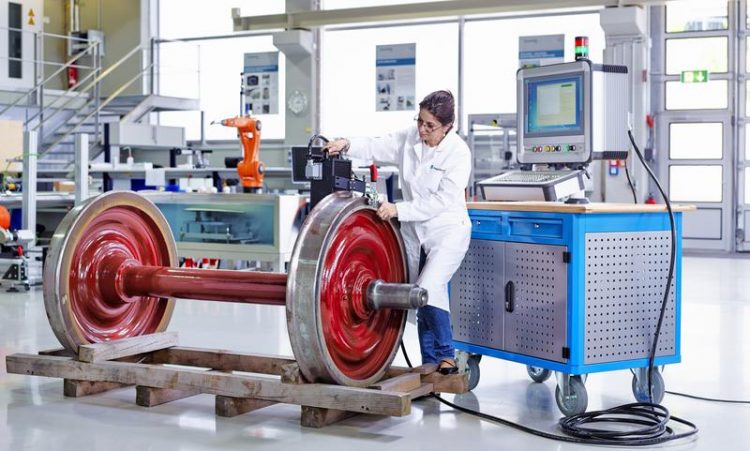Detecting residual stresses on freight train wheels

Determination of residual stresses in freight train wheels Uwe Bellhäuser
In the case of a car, the braking operation is carried out in seconds – jamming on the brakes and shortly afterwards the vehicle has stopped. But with a fully loaded freight train weighing lots of tons braking takes much longer – on long descents braking, which is required to prevent the train’s unwanted acceleration, can even take more than 30 minutes.
For the wheels and brakes this long braking time means hard work – such a strong mechanical loading and heating of the wheels may cause so-called tensile residual stresses, which can lead to cracks in the wheel tread and – worst case – to wheel breakage.
Geislinger Steige and Tauernbahn are best examples for routes that cause heavy endurance stress in wheels. Their strong inclinations and partly narrow radii require the permanent use of the wagons´ block brakes which generate the braking force by pressing the brake shoes against the tread of the wheels.
The scientists and engineers of the Fraunhofer Institute for Nondestructive Testing IZFP performed an elaborate redesign of the hard- and software of the so-called UER systems* by evaluating the experience gained with previous versions of the systems. Thus, they succeeded in adapting the new versions even better to the specific needs of the maintenance and wheel manufacturers plants.
While maintaining ease of use a variety of options for customer-specific documentation and report generation have been added. In particular, for the testing of newly manufactured wheels an optional software evaluation module is now available.
All UER systems, the new ones as well as all previously delivered systems, are integrated into the remote maintenance network of Fraunhofer IZFP, i.e. in case of a failure the service team is able to perform an extensive error analysis by remote access via Internet.
The inspection instruments are applied in the manufacturing process of new wheels, but especially in the maintenance of the freight train wheels.
Media Contact
All latest news from the category: Trade Fair News
Newest articles

“Nanostitches” enable lighter and tougher composite materials
In research that may lead to next-generation airplanes and spacecraft, MIT engineers used carbon nanotubes to prevent cracking in multilayered composites. To save on fuel and reduce aircraft emissions, engineers…

Trash to treasure
Researchers turn metal waste into catalyst for hydrogen. Scientists have found a way to transform metal waste into a highly efficient catalyst to make hydrogen from water, a discovery that…

Real-time detection of infectious disease viruses
… by searching for molecular fingerprinting. A research team consisting of Professor Kyoung-Duck Park and Taeyoung Moon and Huitae Joo, PhD candidates, from the Department of Physics at Pohang University…





















